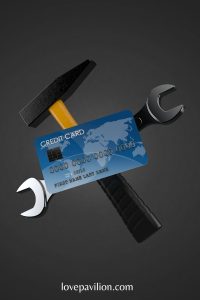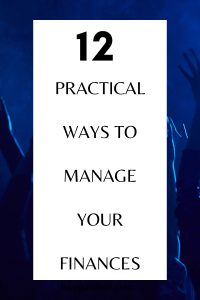Some of us have tried virtually everything and anything to make sure we have a way to actually manage our finances but nothing seems to be working out.
You actually don’t need to be a financial expert or even a guru at figures to manage your finances properly.
It all starts with you cultivating good money habits and working on cutting off some really bad habits if you have built them over time.
It’s not magical and neither does it happen overnight.
However, you can work it up gradually and make it to the top.
Remember what is said about little drops of water making the mighty ocean.
I have been able to compile 12 practical ways to manage your finances.
12 Practical Ways To Manage Your Finances
1. Review your expenses and make changes where necessary
The first step to achieving financial freedom is by being frank with yourself.
Tell yourself the truth and be objective with yourself by making a review of your expenses.
If you want to save money, it is important to take a close look at your spending and make changes where necessary.
There are a number of ways to do this, such as tracking your spending for a month or setting a budget.
That way, you know what comes in and what comes in and can decide what goes out.
2. Automate your finances
Automating your finances is all about having your expenses follow a strict form of deduction from your account.
This is by setting up a budget and automatic payment method.
This will help you save money on interest, as well as make sure that your bills are paid on time.
3. Find a budgeting app that works for you
There are a lot of budgeting apps out there, but they all have different features.
Some are focused on tracking your income and expenses, while others focus on helping you save money and plan for the future.
Try downloading a few different apps, keeping in mind what your financial goals are, and then choose one that works best for you.
Use the app to track your income and expenses.
Once you’ve downloaded a budgeting app, create an account and enter your income and expenses.
This will help you see where your money is going each month so you can make changes as needed.
Set up a savings goal If you have extra money each month, set it aside in an emergency fund or retirement account.
4. Automate your savings account transfers
It’s not just your expenses that should be automated.
You can set up a savings account that automatically transfers money into your checking account each month.
This way, you don’t have to worry about forgetting to make the deposit yourself.
This is especially helpful if you want to save for retirement or an emergency fund.
You can also set up an automatic transfer to a separate account in order to save for something specific.
For example, if you want to save money for a vacation or wedding, set up an automatic transfer so that it comes out of your checking account each month and goes directly into the savings account that’s specifically designated for these expenses.
5. Track your spending habits with cash envelopes
It is understandable that not every one of us will be tech-savvy or digital, hence the inception of cash envelopes.
If you’re struggling with overspending, try using cash envelopes.
This method involves setting aside a certain amount of money each month and putting it in an envelope that has your name on it.
Then, when you’re ready to make purchases throughout the month, take out the corresponding cash amount from your envelope and put it back in when you’re finished spending.
This way, you won’t be tempted to overspend because there isn’t any available money left in your account.
This method has a few benefits.
First, it provides you with an easy way to track your spending habits by looking at the amount of money in each envelope.
Second, it prevents you from overspending because you have to physically go out and withdraw more cash if you run out of money.
6. Don’t use credit cards at all
Personally, this has been a life-saving hack for me.
Credit cards give a false sense of riches
Credit cards make it easy to spend money without realizing it.
If you use your credit card to make purchases, you don’t see the money leave your bank account until later, which means that it’s easier for you to overspend.
Instead of using credit cards, opt for debit cards or cash if possible.
That way, you know the exact money leaving your hand and the money left in your wallet.
7. Use cash bonuses to reward yourself
If you want to spend money on something, save up your cash first and then use it as a reward for reaching a goal.
For example, if you want to buy a new pair of shoes with your next paycheck but are currently saving money for something else, don’t allow yourself to spend any money on the shoes until after you’ve reached that goal.
Use bonuses from your buy backs to purchase that want.
As it is not a necessity, then don’t go out splurging directly on it.
8. Pay off your balance in full each month
Paying off your balance in full each month is the single most important step you can take toward getting out of debt.
You’ll save money on interest charges and have more freedom to use your credit cards for purchases that you actually want or need.
Do not carry your balances over as it will keep piling up.
There is nothing you want to do with a debt record, rather you’d want to build a credit record on your honour.
9. Take advantage of free money offers, like store loyalty programs and bank bonuses
Store loyalty programs, such as those offered by Amazon and Best Buy, can be a great way to save money on your purchases.
These programs offer perks like free shipping which can often be more cost-effective than paying for express shipping, discounts and coupons on select items and even cash back when you use your credit card with the store.
If you’re a frequent Best Buy customer, for example, you can save up to $300 per year with the store’s rewards program.
Bank bonuses are another way to get free money.
Banks usually offer them as an incentive for opening a new account and meeting certain requirements, such as depositing a certain amount of money or using your card for purchases within a specific timeframe.
Apart from you saving up your money, using these opportunities will help you build a good financial discipline and record that will pay you off in the long run.
10. Avoid impulse buying
Impulse buying is a problem for many people who want to save money.
The solution?
Wait 24 hours or more before making that purchase.
That way, you’ll have time to think about whether or not it’s something you really need and how it will fit into your budget.
If you still want the item after this waiting period, then go for it.
11. Set up automatic bill payments to eliminate late fees and overdraft charges
If you’re trying to live within your means, setting up automatic bill payments is a great way to ensure that you don’t end up being hit with late fees and overdraft charges.
These charges can add up quickly, so it’s important to make sure they don’t go unnoticed.
In addition, by setting up automatic bill payments at the beginning of each month, rather than waiting until the last minute, you will have more money available for other expenses during that time period.
When it comes to debt, it can be helpful to set up automatic payments.
This will ensure that your monthly payments are made on time and help you avoid lateness fees.
12. Cut back on unnecessary expenses
If you want to save money, it is important to take a close look at your spending and make changes where necessary.
There are a number of ways to do this, such as tracking your spending for a month or setting a budget.
Cut back on unnecessary expenses If you want to save money, it is important to take a close look at your spending and make changes where necessary.
Use a scale of preference to prioritize what is really necessary and what is just a need.
Make do with what you have and watch your savings rise.
If you have been struggling with managing your money and you always end up being broke before a new cycle resumes, then I am sure with discipline in following through with the above steps, you’d be on your way to financial liberty.





